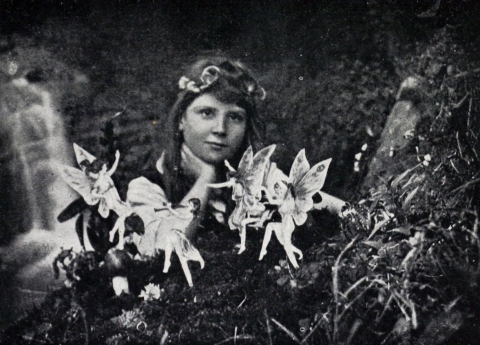
One of the photos from the fairy hoax, masterminded by two little girls, that hoodwinked the creator of Sherlock Holmes
A letter from a reader led me into one of the more challenging articles I wrote for Chalcedon’s print magazine, Faith For All of Life. The reader wished to know what we thought of fairies.
https://chalcedon.edu/magazine/christian-reconstruction-and-fairies
It turned out that there was quite a lot to be said about fairies.
(P.S.–Some of you have been asking how you can find the new stuff on Chalcedon’s new improved website. Please be patient! I mean, we’ve just finished making sure we’ve posted all the old stuff, and tagged it, etc.–and that was a big, big job.)
A very interesting piece and, IMO, quite on target. I especially like your final conclusion; “We don’t like fantasy that tells us you can break God’s laws and get away with it”. The tie-in to pornography is spot on, as well.
Everything we do in this world requires of us some cost. Eat that cupcake and you pay for it on your waistline, drive too fast and you get a ticket, or possibly have a collision. If we had superhuman powers, we would face superhuman consequences for our choices. Understanding this is built into us, although many, many people do not choose to accept the facts as they are.
Some years ago, there was a young man that worked where I did whom was about as arrogant and pig-headed as anyone I’d ever met. He acted as if he was smarter and more skilled than people with many times more experience than he had. When a mature person sees such a thing, they know where it will end up, such a young man will eventually end up finding trouble and being humbled. This is reassuring, because we know that obnoxious punks become civilized or end up socially marginalized.
In fantasy, no such thing has to happen, but it can happen. So when the villains get there’s, such as what happens occasionally in the Bell Mountain series, it’s satisfying. The Emperor in Star Wars comes to an ignominious end and we like that.
Magic, “an acquired ability to circumvent the laws of nature” deprives us of our sense of justice and of order. If you have to work to keep an old clunker on the road and I can materialize a Mercedes in the bank of an eye, that is unjust. It’s just, plain, wrong! If you have to endure in silence while I can immobilize my enemies with a mere stare, that is unjust. I would be stepping out of my God-given limitations.
If I go home tonight and the cat speaks to me in english, that is wrong! She’s a cat and doesn’t get to use symbolic language. If she wants her cream, she needs to stand in front of the fridge like any other cat. 🙂
There is one other category which hasn’t been discussed, and that is extraordinary, though not necessarily supernatural abilities. Wytt and his species can do things which are remarkable, but not necessarily outside the realm of possibility. The fact is, we don’t know all of the abilities or the sensory limits of the animal realm. Wytt is a mystical creature, but not magical. In one sense, he is like a fairy, because he has some human traits and some abilities beyond those of humans, but not beyond those possible in nature. (Likewise, a fairy can fly, but it has wings so it’s not entirely inexplicable.)
If you wanted to split hairs finely enough, all fiction is untrue, but if it’s not presented as being true it wouldn’t be a lie. I’ve read Clive Cussler books which contained places I’ve actually been and objects which I know to be real, but I know that the work is an imaginary tale involving some real things.
Fiction serves a very real purpose, because it allows us to direct the mind to contemplate things which extend beyond our immediate surroundings.
One of my favorite examples, and an example I consider to be a masterpiece of story telling, is found in Murder on the Orient Express. What a superbly crafted work of fiction! A microcosm, set on a train which eventually becomes isolated from the outside world by an avalanche which covers the tracks with snow. During that time, Poirot has to not only solve a murder, but decide whether or not it was a justified killing. The evidence would be irretrievable with the next snowfall. An amazing concept for a novel.
I read somewhere that Walt Disney used Marilyn Monroe’s figure for Tinkerbell (but maybe that’s fantasy). Fantasy is a great way to explore one’s imagination. Just as God’s physical laws are the same throughout the universe, so are His laws the same for correct thought in whatever we write. The imagination is the limit as long as it abides within the perimeter of His laws. FYI: Whenever imagination is mentioned in the Bible it is always in a negative context..